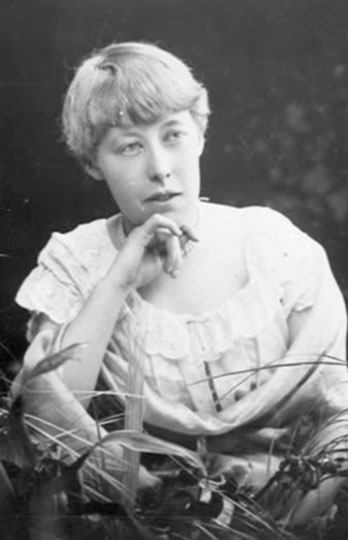 Dublin- born Katharine Tynan was a popular and immensely productive writer, active from the 1880s to 1931. She published over one hundred novels, eighteen collections of poems, journalism, autobiography and many short stories. Like Ellen O’Leary, she was an enthusiastic nationalist and active champion of the Irish literary revival. However as with O’Leary, we find something of a contrast between Tynan’s activity in male spheres of public life, and the idealisation of traditional female roles in her writing, work which also emphasises devotional Catholic themes.
Dublin- born Katharine Tynan was a popular and immensely productive writer, active from the 1880s to 1931. She published over one hundred novels, eighteen collections of poems, journalism, autobiography and many short stories. Like Ellen O’Leary, she was an enthusiastic nationalist and active champion of the Irish literary revival. However as with O’Leary, we find something of a contrast between Tynan’s activity in male spheres of public life, and the idealisation of traditional female roles in her writing, work which also emphasises devotional Catholic themes.
‘Any Woman’ (1911)
The poem was originally published in the1911 collection New Poems under the title ‘The Mother’ and was frequently anthologised afterwards, later as ‘Any Woman’. What similarities can you find between this poem and 'A Legend of Tyrone' (which can be found in our previous article on Ellen O'Leary)?
I am the pillars of the house;
The keystone of the arch am I.
Take me away, and roof and wall
Would fall to ruin me utterly.
I am the fire upon the hearth,
I am the light of the good sun,
I am the heat that warms the earth,
Which else were colder than a stone.
At me the children warm their hands;
I am their light of love alive.
Without me cold the hearthstone stands,
Nor could the precious children thrive.
I am the twist that holds together
The children in its sacred ring,
Their knot of love, from whose close tether
No lost child goes a-wandering.
I am the house from floor to roof,
I deck the walls, the board I spread;
I spin the curtains, warp and woof,
And shake the down to be their bed.
I am their wall against all danger,
Their door against the wind and snow,
Thou Whom a woman laid in a manger,
Take me not till the children grow!
Ways of reading – gender and identity
One effect of Tynan’s style as discussed above is to suggest that there is something universal and unchanging about the role of women-- an idea implicit in the title itself, ‘Any Woman’.
Do you find the woman’s viewpoint in the poem limited and confining? Or do you read the poem as a positive statement about female power and endurance? Find a few points to support either interpretation.
While we might acknowledge that there is some truth in this idea that motherhood involves loss of individuality, the important point is how Tynan portrays this process. If we were less sympathetic to the vision of the poem, we might find that Tynan’s poem draws on oppressive stereotypes to enforce an unrealistic idealisation of women’s experience. There is no ‘right answer’ here- it all depends on how we respond to the poem at a given reading. This ambiguity is an important characteristic of poetry, and you will notice it again if you listen to the discussion between Angus Calder and the third poet we look at in the last of these articles, Nuala Ní Dhomhnaill.


Rate and Review
Rate this article
Review this article
Log into OpenLearn to leave reviews and join in the conversation.
Article reviews